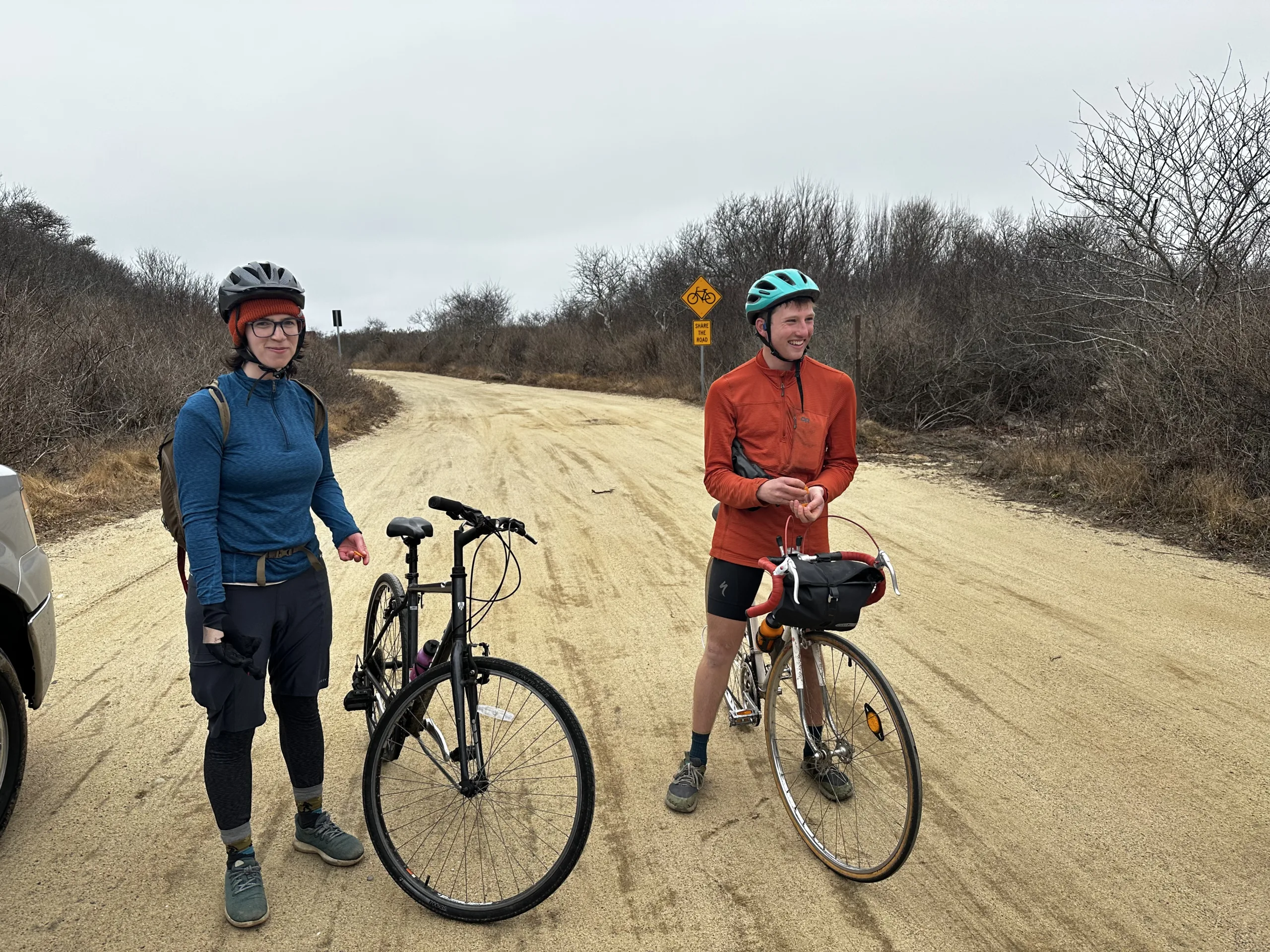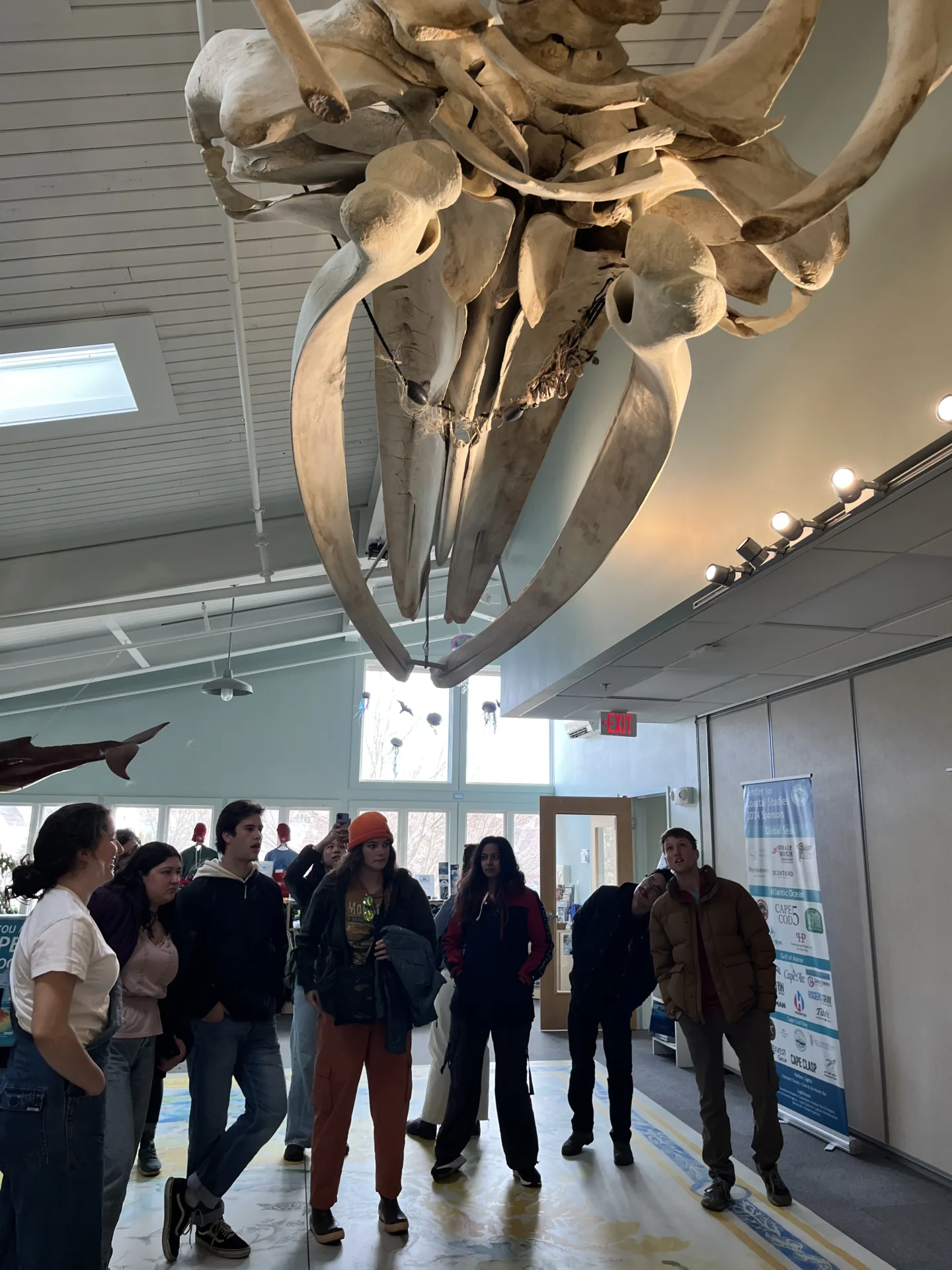Programs Blog
SEA Students Loose in Provincetown

March 18, 2025
Location: Provincetown, Massachusetts
Weather: Cloudy, 45°F, 10 knot wind from the South.
Hello! I’m Ana Hoffman Sole, a Junior at Cornell University in Ithaca New York, majoring in Biological Sciences with a concentration in Marine Biology. I’m considering double majoring into Earth and Atmospheric Sciences, just to make my degree even more of a mouthful.
This Saturday we had an optional field trip to Provincetown. It was an opportunity to learn about more of the ocean engagement happening on Cape Cod and to run around a new exciting place. Most of us made the sensible choice to make the 75-mile trip by car, but Henry and I chose to stretch the trip out to seven hours by riding the bikes SEA provides instead.
Once we all arrived with our chosen vehicles, we met Tommy, a friend of one of our professors and a research assistant at the Provincetown Center for Coastal Studies. We stood on top of a hill overlooking East Harbor, Provincetown, Cape Cod Bay, and the Atlantic Ocean. That particular hill is the end of a terminal moraine, or the pile of sand that the glaciers left at the end of the last ice age, about 20,000 years ago. The final curl of the Cape that we were looking down on is the sand that the Gulf Stream current has washed out since the glaciers created the Cape.
After looking from above, we were let loose on the town to explore and find lunch. We broke into smaller groups to check out the many (although not as many as in the summer) restaurants, candy stores, thrift shops, and other little establishments Provincetown has to offer.
In the afternoon we reconvened to get a tour of the Center for Coastal Studies and to learn about the work they do. Walking into the building, the first thing that jumps out is the whale skeleton hanging from the ceiling. That skeleton is Spinnaker, a juvenile humpback whale that got tangled in fishing gear. The initial entanglement happened in waters off the Carolinas, but Spinnaker carried that line all the way up the coast to Massachusetts, where the Center’s Entanglement Response Team was called about it. The team made three separate trips out on their boat to cut the line off. They were successful in removing most of it, but the line had some buoys that made it almost impossible to remove, and it had already fractured Spinnaker’s skull. Her skeleton is displayed with the original line embedded in the skull.
After hearing the tragic story of Spinnaker, we learned about some of the exciting work happening through the Center for Coastal Studies. We got to ask one of the members of the Entanglement Response Team about her career, and we learned that the boats have just been put in the water for the season. We talked about ways that entanglements can be limited, and how fishermen are being involved in those efforts.
We thanked Tommy for their excitement, for welcoming us to Provincetown, and for the tour, and we got on the road. We stopped at the beach on the way back- I’m told everyone had fun while I was napping in the van. Our day trip ended with the ride back to SEA campus, where we disbanded and started resting up for the next adventure.

Recent Posts from the Ships
- Ocean Classroom 2024-A collaborative high school program with Proctor Academy
- Collaborations and Long-term Commitments: SEA’s Caribbean Reef Program Sets a Course for Coastal Programs that Compliment Shipboard Experiences.
- Sea Education Association students prepare for life underway using state of the art nautical simulation from Wartsila Corporation.
- SEA Writer 2022, Magazines From the Summer SEA Quest Students
- Technology@SEA: Upgrades Allow Insight into Ocean Depths
Programs
- Gap Year
- Ocean Exploration
- High School
- Science at SEA
- SEA Expedition
- SEAScape
- Pre-College
- Proctor Ocean Classroom
- Protecting the Phoenix Islands
- SPICE
- Stanford@SEA
- Undergraduate
- Climate and Society
- Climate Change and Coastal Resilience
- Coral Reef Conservation
- Marine Biodiversity and Conservation
- MBL
- Ocean Exploration: Plastics
- Ocean Policy: Marine Protected Areas
- Oceans and Climate
- Pacific Reef Expedition
- The Global Ocean: Hawai'i
- The Global Ocean: New Zealand